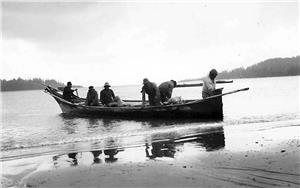On May 17, 1999, for the first time in more than 70 years, Makah whalers successfully hunt a gray whale in the waters off the Olympic Peninsula, where their ancestors hunted whales for thousands of years. Killing the whale unleashes a storm of protest from animal rights activists who have worked in court and on the open seas to stop the Makah from whaling, but Makah leaders see the successful hunt as a further step in revitalizing their culture. Makah families hunt whales again in 2000, without success, and then court decisions put the revived whaling on hold.
For thousands of years, the Makah, who occupied a large part of the Olympic Peninsula around Cape Flattery at the northwest tip, hunted the gray whales that migrated in the thousands past Cape Flattery every spring and fall. In the 1855 Treaty of Neah Bay, the Makahs gave up most of their land, but insisted that the treaty guarantee them "The right of taking fish and of whaling or sealing at usual and accustomed grounds and stations ... in common with all citizens of the United States" (Treaty of Neah Bay). They became the only tribe in the United States with a treaty expressly guaranteeing the right to whale. However, Makahs did not hunt gray whales after the 1920s, when commercial whaling decimated the population.
Decision to Resume Whaling
By 1994, the gray whale population rebounded and was removed from the Endangered Species List, and the Makah decided to resume whaling. Supported by the U.S. government, the tribe sought and ultimately won approval from the International Whaling Commission to take up to five gray whales a year.
The Makah decision generated a storm of protest from anti-whaling and animal rights groups. More than 350 groups from 27 countries opposed the hunt. Opponents feared that other indigenous peoples with a whaling tradition would try to follow suit, or that U.S. support for the Makah hunt would weaken efforts to end commercial whaling. One of the most vocal critics was the Sea Shepherd Conservation Society, which threatened to use its fleet to disrupt the hunt. The opponents’ initial court challenges were rejected, and the hunt was cleared to begin in the fall of 1998. Protestors and reporters descended on the Makah reservation, and the whaling crew practiced in their carved cedar canoe Hummingbird, but there was no hunt until spring.
The first Makah whale hunt in more than 70 years took place on May 10, 1999, off Cape Alava, south of Cape Flattery. As the whalers in the Hummingbird approached whales, protestors in speedboats and Zodiacs tried to stop them. The whalers hunted again on May 15, but did not harpoon a whale on either day.
The Whale Is Caught
Then early on the morning of May 17, 1999, before any protest boats appeared, the Makah whalers harpooned and killed a a 30-foot gray whale off Cape Alava. TV cameras broadcast live from a helicopter overhead as the Hummingbird approached, the whale surfaced, and harpooner Theron Parker thrust the harpoon into it. After being harpooned a second time, the whale was shot and killed by a rifleman on the support boat. Only then did Sea Shepherd's ship Sirenian reach the scene. The whale was towed to Neah Bay, where Makahs and many visitors waited to celebrate, and the Hummingbird brought it ashore, accompanied by canoes from visiting tribes.
The whale was carved on the beach in preparation for a potlatch feast. Makahs of all ages ate fresh blubber, many for the first time. A 13-year-old said "I've heard so many stories about this from my grandpa. Now I finally know what he meant" (The Seattle Times, May 18, 1999). The potlatch, attended by members of native groups from around the world, was held the following weekend to celebrate the successful hunt. Meanwhile protestors condemned the whale's death and the Makahs' celebration. A candlelight vigil was held in Seattle the evening of the kill. Newspapers were deluged with letters and e-mails denouncing the hunt and the Makah.
Several Makah families hunted whales again in the spring of 2000, and were confronted on the water by protestors. No whales were caught, and in June 2000, the 9th Circuit Court of Appeals sided with whaling opponents and suspended the hunt. A new round of litigation resulted in a second decision from the Court of Appeals, again blocking the hunt. After two unsuccessful attempts to convince the court to change its ruling, in 2005 the Makah tribe began the lengthy process of attempting to comply with the procedures that the court said are necessary before the tribe can legally hunt whales. In September 2007, impatient with delays and what they saw as violation of their treaty rights, five whalers acting without permission from either the tribe or the federal government killed a second whale. The Coast Guard immediately confiscated that whale (which then sank in hundreds of feet of water) so that as of mid-2009 the whale taken on May 17, 1999, remains the only one harvested by Makahs since the 1920s.
Although unhappy with the subsequent court decisions, Makah leaders saw the 1999 hunt as a success. Attendance at Makah language classes swelled following the hunt. Makah high school students assembled the bones of the whale for display in the museum at the Makah Cultural and Research Center. John McCarty, first chairman of the tribe's whaling commission, stated:
"The interest of the people in our culture was sparked by the whale. It brought a lot of talk about the culture and how the Makahs were in the past. That was our aim: to revitalize the culture" (Seattle P-I, July 14, 2001).

